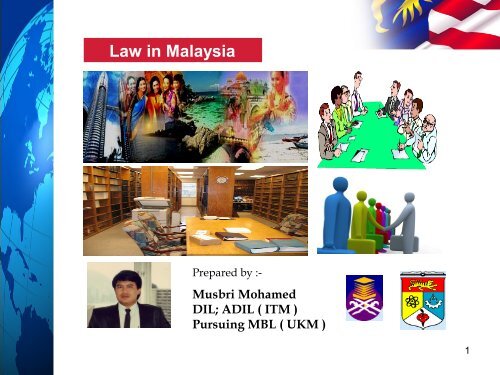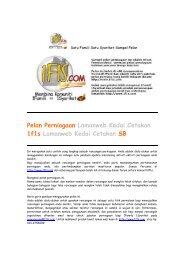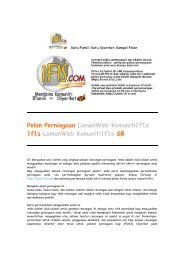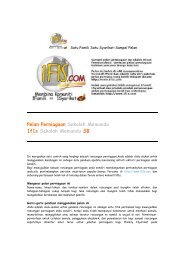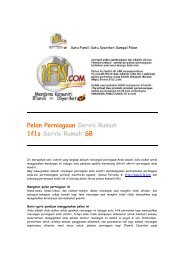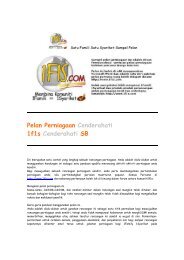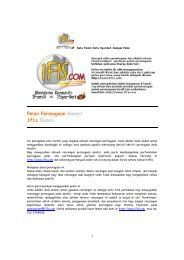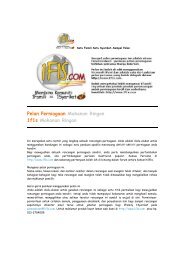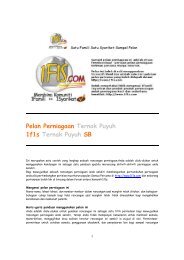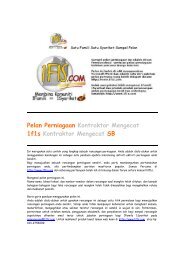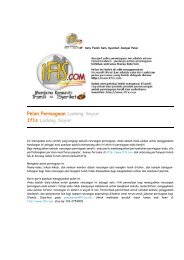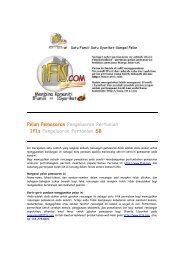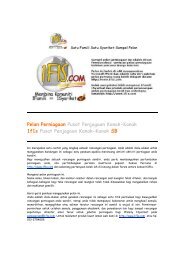Law in Malaysia
Law in Malaysia
Law in Malaysia
Create successful ePaper yourself
Turn your PDF publications into a flip-book with our unique Google optimized e-Paper software.
<strong>Law</strong> <strong>in</strong> <strong>Malaysia</strong><br />
Prepared by :-<br />
Musbri Mohamed<br />
DIL; ADIL ( ITM )<br />
Pursu<strong>in</strong>g MBL ( UKM )<br />
1
What are Your<br />
Rights ?<br />
People have to know their scope of rights and<br />
freedom granted to them by government and must<br />
be able to demand for their rights whenever<br />
<strong>in</strong>justice takes place.<br />
2
<strong>Law</strong> protects basic <strong>in</strong>dividual rights and freedom such as liberty,<br />
equality and freedom of speech. It prevents <strong>in</strong>dividuals <strong>in</strong> powerful<br />
position from tak<strong>in</strong>g an unfair advantage of other people.<br />
<strong>Law</strong> ensures a safe and peaceful society, <strong>in</strong> which <strong>in</strong>dividual rights<br />
are preserved. Certa<strong>in</strong> governments have cruel laws, where police<br />
and armies arrests and punishes people without a trial <strong>in</strong> the court.<br />
<strong>Law</strong> applies to every persons, public authorities, governmental<br />
departments, private bodies, profit mak<strong>in</strong>g organizations as well as<br />
non-governmental organizations.<br />
3
In <strong>Malaysia</strong>, the legislative body which is made up of Lower<br />
House and the Upper house, both which consists of<br />
representatives of people, makes law.<br />
The executive body which is headed by YDPA, who is assisted by<br />
Prime M<strong>in</strong>ister, enforces the law, so that everyone will follow.<br />
The judiciary body judges law.<br />
These three bodies form the <strong>Malaysia</strong>n government.<br />
The law, however, is an <strong>in</strong>dependent entity by itself although it is<br />
made, enforced and judged by the government.<br />
4
<strong>Malaysia</strong>n sources of law comprises laws that have<br />
emerged from three significant periods.<br />
The <strong>Malaysia</strong>n history orig<strong>in</strong>at<strong>in</strong>g from :-<br />
1.Malacca Sultanate to spread of Islamic religion to<br />
Malacca<br />
2. South East <strong>Malaysia</strong><br />
3. And f<strong>in</strong>ally the colonial rule of British over the<br />
Malayan land which led to the sources of <strong>Malaysia</strong>n as<br />
can be seen today.<br />
5
The source of <strong>Malaysia</strong>n law<br />
can be classified <strong>in</strong>to :-<br />
1.Written law,<br />
2.Unwritten law, and<br />
3.Muslim law.<br />
6
The laws of <strong>Malaysia</strong> can be divided <strong>in</strong>to two types of laws—<br />
written law and unwritten law.<br />
Written laws are laws which have been enacted <strong>in</strong> the<br />
constitution or <strong>in</strong> legislations.<br />
Unwritten laws are laws which are not conta<strong>in</strong>ed <strong>in</strong> any<br />
statutes and can be found <strong>in</strong> case decisions. This is known as<br />
the common law or case law . In situations where there is no<br />
law govern<strong>in</strong>g a particular circumstance, <strong>Malaysia</strong>n case law<br />
may apply. If there is no <strong>Malaysia</strong>n case law, English case law<br />
can be applied. There are <strong>in</strong>stances where Australian, Indian,<br />
and S<strong>in</strong>gaporean cases are used as persuasive authorities.<br />
7
Written law is the law written and<br />
gazetted to be followed by the<br />
<strong>in</strong>dividuals of a State.<br />
It is made up of :-<br />
Federal constitution,<br />
State constitutions,<br />
Legislations, and<br />
Subsidiary legislations.<br />
8
Federal Constitution is said to be the highest legal authority of<br />
land.<br />
The Constitution was drafted by the Reid Commission <strong>in</strong> 1956 with<br />
5 representatives from India, British, Pakistan and Australia.<br />
The Constitution came <strong>in</strong>to force follow<strong>in</strong>g the <strong>in</strong>dependence on<br />
August 31, 1957. It consists of 15 Parts, 183 Articles and 13<br />
Schedules.<br />
Article 4(1) state that the constitution is the supreme law of the<br />
federation and any law passed after Merdeka Day which is<br />
<strong>in</strong>consistent with this constitution shall, to the maximum extent of<br />
<strong>in</strong>consistency, be void.<br />
9
Article 159 and 161E provides<br />
provisions to allow the constitution<br />
to be amended with the condition of<br />
2/3rds majority <strong>in</strong> both houses of<br />
Parliament agree<strong>in</strong>g to the<br />
amendment.<br />
10
State Constitution is the same as Federal<br />
Constitution, except it is set by the states <strong>in</strong><br />
<strong>Malaysia</strong>. The 8th schedule of the Federal<br />
Constitution mentions certa<strong>in</strong> provisions that are to<br />
be <strong>in</strong>cluded <strong>in</strong> the State Constitutions such as state<br />
executive members, f<strong>in</strong>ance, the state legislative<br />
assembly, roles of the Sultan or Yang di-Pertua<br />
Negeri, and etc. Article 71 mentions that all state<br />
constitutions must conta<strong>in</strong> their provisions,<br />
otherwise the Parliament can enforce those<br />
provisions or abolish any provision <strong>in</strong> the state<br />
constitution that contradict with those provisions.<br />
11
Legislations are the laws that are established by the<br />
Parliaments at federal level and by the State<br />
Legislative Assemblies at the state level. In<br />
<strong>Malaysia</strong>, the legislative gets its authority from the<br />
Federal Constitution. It mentions the scope of the<br />
Parliament and the State Assembly.<br />
If the Parliament (or any State Assembly) makes a<br />
law which is not <strong>in</strong> its scope of authority or<br />
contradicts with the constitution, the courts can<br />
declare that as null and void.<br />
12
Article 74 of Federal Constitution states that parliament<br />
may make law with referr<strong>in</strong>g to matters provided <strong>in</strong> the<br />
federal list and state legislatives may make law with<br />
referr<strong>in</strong>g to matter provided <strong>in</strong> the state list. Concurrent<br />
list is <strong>in</strong> the scope of enactment by both parliament and<br />
state legislatives. State list, federal list and the concurrent<br />
list are conta<strong>in</strong>ed <strong>in</strong> the N<strong>in</strong>th Schedule of Federal<br />
Constitution.<br />
If there are any contradictions between federal and state<br />
laws, the federal law shall prevail and state law is void to<br />
the scope of <strong>in</strong>consistency. This was provided by Article<br />
75 of Federal Constitution.<br />
13
Parliament may pass the power to legislate any subsidiary legislation<br />
dur<strong>in</strong>g emergency, even if there are any contradictions with the Federal<br />
Constitutions <strong>in</strong>volved, due to some exception <strong>in</strong> Article 150 of Federal<br />
Constitution.<br />
The related case is<br />
Eng Keock Cheng v. Public Prosecutor.<br />
In this case, Eng Keock Cheng who was convicted committed 2 offences<br />
dur<strong>in</strong>g emergency period and was ordered to put to death. He appealed on<br />
the ground that there were neither a prelim<strong>in</strong>ary enquiry nor a jury<br />
adopted by High Court which were required under Crim<strong>in</strong>al Procedure<br />
Act and claimed that the procedures set out <strong>in</strong> Emergency (Crim<strong>in</strong>al Trial)<br />
Regulations 1964 was <strong>in</strong>valid as it contradicts with Article 8 of Federal<br />
Constitution.<br />
It was held that Parliament may pass the power to legislate any subsidiary<br />
legislation dur<strong>in</strong>g emergency, even if there are any contradictions with the<br />
Federal Constitutions <strong>in</strong>volved, due to some exception <strong>in</strong> Article 150 of<br />
Federal Constitution. The appeal was dismissed.<br />
14
Unwritten laws are laws that are not enacted and not found <strong>in</strong><br />
any constitution. It comprises of English law (Common <strong>Law</strong> and<br />
Equity), judicial decisions and customs.<br />
Common <strong>Law</strong> is a major part of many States, especially<br />
Commonwealth countries. It is ma<strong>in</strong>ly made up of non –<br />
statutory laws, which are the precedents derived from<br />
judgments given on real cases by judges.<br />
<strong>Law</strong> of Equity resolves disputes between persons by referr<strong>in</strong>g to<br />
pr<strong>in</strong>ciples of fairness, equality and justness. In these cases,<br />
noth<strong>in</strong>g was done aga<strong>in</strong>st the law by the parties to dispute, but<br />
their rights are <strong>in</strong> conflict. Thus, it is different from law; both the<br />
Statutory <strong>Law</strong> enacted by Parliament and State Legislatives and<br />
Common <strong>Law</strong> which consists of precedents and op<strong>in</strong>ions given<br />
on real cases by judges.<br />
15
Section 3(1)(a) Civil <strong>Law</strong> Act 1956 states<br />
that courts <strong>in</strong> Pen<strong>in</strong>sular <strong>Malaysia</strong> should<br />
apply Common <strong>Law</strong> and the <strong>Law</strong> of Equity<br />
as adm<strong>in</strong>istered <strong>in</strong> England on 7th April<br />
1956.<br />
Section 3(1)(b) and Section 3(1)(c) of Civil<br />
<strong>Law</strong> Act 1956 states that courts <strong>in</strong> Sabah<br />
and Sarawak should apply common law<br />
and law of equity together with the statutes<br />
of general application as adm<strong>in</strong>istered <strong>in</strong><br />
England on 1st December 1951 and 12th<br />
December 1949 accord<strong>in</strong>gly.<br />
16
But it is not stated that the Common <strong>Law</strong> and<br />
<strong>Law</strong> of Equity <strong>in</strong> <strong>Malaysia</strong> should rema<strong>in</strong><br />
unmodified and follow the same law as<br />
adm<strong>in</strong>istered <strong>in</strong> England.<br />
Common law and law of equity <strong>in</strong> <strong>Malaysia</strong><br />
should be developed and amended accord<strong>in</strong>g to<br />
the local needs. In addition, these two laws<br />
should also take <strong>in</strong>to account of changes <strong>in</strong> these<br />
laws <strong>in</strong> England.<br />
However, <strong>Malaysia</strong>n government can set their<br />
own scope for the amended or repealed Common<br />
<strong>Law</strong> and <strong>Law</strong> of Equity <strong>in</strong> <strong>Malaysia</strong>.<br />
17
In the case Commonwealth of<br />
Australia v. Midford (<strong>Malaysia</strong>) Sdn.<br />
Bhd.,<br />
it was held that the doctr<strong>in</strong>e of<br />
sovereign or crown immunity which<br />
was developed <strong>in</strong> English Common<br />
<strong>Law</strong> after 1956 should apply <strong>in</strong><br />
<strong>Malaysia</strong>. It was said that any<br />
developments <strong>in</strong> English Common <strong>Law</strong><br />
after 1956 should apply <strong>in</strong> <strong>Malaysia</strong>.<br />
18
In the case<br />
Smith Kl<strong>in</strong>e & French Laboratories Ltd. v. Salim (<strong>Malaysia</strong>) Sdn.<br />
Bhd.,<br />
It was held that the courts have the authority to put aside any<br />
Common <strong>Law</strong> or <strong>Law</strong> of Equity which cannot be applied <strong>in</strong><br />
<strong>Malaysia</strong>.<br />
In the case<br />
Jamil b<strong>in</strong> Harun v. Yang Kamsiah & Another,<br />
It was decided that courts have the authority to decide whether to<br />
follow English <strong>Law</strong> (common law and law of equity) or Federal<br />
law, consider<strong>in</strong>g the circumstances and the scope the written law<br />
permits to do so.<br />
In the case Karpal S<strong>in</strong>gh v. Public Prosecutor,<br />
It was held that the crim<strong>in</strong>al offences <strong>in</strong> <strong>Malaysia</strong> were provided by<br />
Crim<strong>in</strong>al Procedure Code of <strong>Malaysia</strong> and therefore, there is no<br />
allowance for English law to apply.<br />
There are certa<strong>in</strong> boundaries as to the application of Common <strong>Law</strong><br />
and <strong>Law</strong> of Equity <strong>in</strong> <strong>Malaysia</strong>.<br />
19
Common law can apply <strong>in</strong> the absence of local<br />
legislation. Local law is regarded highly that the<br />
English law. The English law is only meant to fill <strong>in</strong><br />
the lacuna, <strong>in</strong> which the local legislation is not<br />
present.<br />
Only the relevant part which is suited to the local<br />
needs and circumstances applies. <strong>Malaysia</strong> is made<br />
up of different races, each possess<strong>in</strong>g their own<br />
customs, different from English law. The entire<br />
importation of English law means that the<br />
sovereignty of local race is affected.<br />
20
The case law related to the boundaries of application<br />
is,Syarikat Batu S<strong>in</strong>ar Sdn. Bhd. v. UMBC F<strong>in</strong>ance Bhd.<br />
In this case, problem of double f<strong>in</strong>anc<strong>in</strong>g occurred when<br />
first purchaser’s (UMBC F<strong>in</strong>ance Bhd.) <strong>in</strong>dorsement of<br />
ownership claim was not <strong>in</strong>cluded <strong>in</strong> the registration card<br />
of vehicle. UMBC tried to repossess the vehicle. The<br />
pla<strong>in</strong>tiff sued UMBC, claim<strong>in</strong>g that defendants were not<br />
entitled to the vehicle.<br />
It was held that the English law requires the <strong>in</strong>dorsement of<br />
ownership claim <strong>in</strong> registration card, but the law <strong>in</strong><br />
Pen<strong>in</strong>sular <strong>Malaysia</strong> does not really require the<br />
<strong>in</strong>dorsement to be attached with the registration card of<br />
vehicle. The law regard<strong>in</strong>g the <strong>in</strong>dorsement of ownership<br />
claims <strong>in</strong> <strong>Malaysia</strong> which applies to the local circumstances<br />
has to be dist<strong>in</strong>guished from the English law.<br />
21
Two components of English law are English commercial<br />
law and English land law.<br />
English Commercial <strong>Law</strong> is provided by the section 5(1)<br />
and section 5(2) of Civil <strong>Law</strong> Act 1956. The pr<strong>in</strong>ciples of<br />
English commercial law apply <strong>in</strong> Pen<strong>in</strong>sular <strong>Malaysia</strong><br />
except Penang and Malacca <strong>in</strong> absence of local legislations<br />
– Section 5(1). This <strong>in</strong>cludes laws regard<strong>in</strong>g partnership,<br />
bank<strong>in</strong>g, pr<strong>in</strong>cipals and agents, life and <strong>in</strong>surance and so<br />
on. There is no entire dependence on English commercial<br />
law as only certa<strong>in</strong> pr<strong>in</strong>ciples apply and many local<br />
statutes have been <strong>in</strong>serted to the English Commercial<br />
<strong>Law</strong>.<br />
22
English Commercial <strong>Law</strong> applies <strong>in</strong> Penang,<br />
Malacca, Sabah and Sarawak as the law<br />
adm<strong>in</strong>istered <strong>in</strong> these states will be the same as<br />
law adm<strong>in</strong>istered <strong>in</strong> England, <strong>in</strong> the like case at<br />
correspond<strong>in</strong>g period – Section 5(2). These states<br />
are still dependant on the English Commercial<br />
<strong>Law</strong>.<br />
In the case Koon Thean Soong v. Tan Eng Nam, it<br />
was held that English law of partnership was<br />
<strong>in</strong>applicable as there is a local statute govern<strong>in</strong>g<br />
the partnership <strong>in</strong> <strong>Malaysia</strong>, which is Contract<br />
(Malay State) Ord<strong>in</strong>ance.<br />
23
As for the English Land <strong>Law</strong>, none of the English<br />
Land <strong>Law</strong> concern<strong>in</strong>g the tenure, conveyance,<br />
assurance of or succession to any estate, right or<br />
<strong>in</strong>terest there<strong>in</strong> applies <strong>in</strong> <strong>Malaysia</strong>. In <strong>Malaysia</strong>,<br />
National Land Code is the law that governs the<br />
land matters and there is no any allowance for<br />
English land law, unless the National land code<br />
applies it for the judicial comity.<br />
24
The case related is United Malayan Bank<strong>in</strong>g Coperation Bhd &<br />
Another v. Pemungut Hasil Tanah, Kota T<strong>in</strong>ggi. In this case, Johor<br />
State Authority transferred land to a proprietor with certa<strong>in</strong><br />
conditions and annual rent as consideration. The rent and penalties<br />
on arrear payments were not settled. Johor State Authority served a<br />
notice to forfeiture the land as the right of consequence of the<br />
offence. The appellant, Johor State Authority and the proprietor,<br />
appealed and they were granted relief aga<strong>in</strong>st forfeiture. Collector of<br />
Land revenue appealed to federal court and the appellants appealed<br />
to Privy Council.<br />
It was held that English land law concern<strong>in</strong>g the relief aga<strong>in</strong>st<br />
forfeiture is <strong>in</strong>applicable <strong>in</strong> <strong>Malaysia</strong>. Relief aga<strong>in</strong>st forfeiture means<br />
that order for forfeiture is cancelled and it was provided by<br />
<strong>Malaysia</strong>n National Land Code.<br />
25
Judicial decisions are based on ‘doctr<strong>in</strong>e of b<strong>in</strong>d<strong>in</strong>g precedent’.<br />
Precedents are the decisions made by judges previously <strong>in</strong> similar<br />
circumstances. There are two types of precedents.<br />
Mandatory precedent is applied when the decisions of superior court<br />
are b<strong>in</strong>d<strong>in</strong>g on lower courts or the superior courts are bound by their<br />
own decisions previously. However, the decisions of lower courts are<br />
not b<strong>in</strong>d<strong>in</strong>g over superior courts. The lower courts must refer to the<br />
mandatory precedents of superior courts. However, judge of superior<br />
court will dist<strong>in</strong>guish a case before him and the cases lay<strong>in</strong>g down the<br />
precedents and can decide not to follow the mandatory precedent if he<br />
th<strong>in</strong>ks that the mandatory precedent is not related to the case before<br />
him. From this, an orig<strong>in</strong>al precedent is formed.<br />
26
Persuasive precedent is a precedent which is<br />
useful or relevant to a case. It is not mandatory<br />
for the judges to apply persuasive precedent.<br />
Persuasive precedent may be b<strong>in</strong>d<strong>in</strong>g on lower<br />
courts if judges of superior court choose to<br />
apply persuasive precedent.<br />
27
Customs are another important source of<br />
unwritten law. Customs are <strong>in</strong>herited from one<br />
generation to another generation. Every race has<br />
its own customs. Ch<strong>in</strong>ese and H<strong>in</strong>dus customs<br />
are governed by Ch<strong>in</strong>ese and H<strong>in</strong>du Customary<br />
<strong>Law</strong>. Natives <strong>in</strong> Sabah and Sarawak have their<br />
own customary law which relates to the land<br />
and family matters. ‘Adat’ applies to malays.<br />
There are two types of Adat; Adat Perpatih and<br />
Adat Temenggung.<br />
28
Adat Perpatih applies <strong>in</strong> Negeri Sembilan and<br />
Nan<strong>in</strong>g <strong>in</strong> Malacca. The unique characteristic of<br />
Adat Perpatih is matril<strong>in</strong>eal form of<br />
organization. It concerns with matters such as<br />
land tenure, l<strong>in</strong>eage, <strong>in</strong>heritance and election of<br />
members of lembaga and YDP. Matril<strong>in</strong>eal is a<br />
system <strong>in</strong> which one belongs to mother's l<strong>in</strong>eage;<br />
it generally <strong>in</strong>volves the <strong>in</strong>heritance of property,<br />
names or titles from mother to daughters.<br />
29
Adat Temenggung applies <strong>in</strong> other states.<br />
It is based on the characteristic of<br />
patril<strong>in</strong>eal form of organization.<br />
Patril<strong>in</strong>eal is a system <strong>in</strong> which one<br />
belongs to father's l<strong>in</strong>eage; it generally<br />
<strong>in</strong>volves the <strong>in</strong>heritance of property,<br />
names or titles from father to sons.<br />
30
After the establishment of <strong>Law</strong> Reform<br />
(Marriage and Divorce) Act 1976, the family<br />
law has been given enforcement on matters of<br />
marriage, divorce and <strong>in</strong>heritance. As a result,<br />
the Ch<strong>in</strong>ese and H<strong>in</strong>du Customary <strong>Law</strong>s have<br />
lost its effect as an important source of<br />
unwritten law <strong>in</strong> <strong>Malaysia</strong>.<br />
31
Islamic law, which is only applicable to Muslims, is<br />
enacted under the Federal Constitution. The state<br />
legislatures have the power and are permitted to make<br />
Islamic laws perta<strong>in</strong><strong>in</strong>g to persons profess<strong>in</strong>g the Islam<br />
religion. Such laws are adm<strong>in</strong>istered by separate court<br />
system, Syariah Courts. State legislature also has the<br />
jurisdiction over the constitution, organization and<br />
procedures of Syariah Courts.<br />
Now, Islamic laws are <strong>in</strong>creas<strong>in</strong>gly applied <strong>in</strong> bank<strong>in</strong>g and<br />
land laws other than applied to family matters and estate<br />
matters. The YDPA is the head of Islam <strong>in</strong> his home state,<br />
Penang, Malacca, Sabah, Sarawak and Federal Territories.<br />
The head of Islam of other States is Sultan.<br />
32
Sections 3 and 5 of the Civil <strong>Law</strong> Act allows for the<br />
application of English common law, equity rules, and<br />
statutes <strong>in</strong> <strong>Malaysia</strong>n civil cases where no specific laws<br />
have been made.<br />
In 2007, the then Chief Justice of <strong>Malaysia</strong>,Tan Sri<br />
Ahmad Fairuz Abdul Halim questioned to need to<br />
resort to the English common law despite <strong>Malaysia</strong><br />
hav<strong>in</strong>g already been <strong>in</strong>dependent for 50 years and<br />
proposed to replace it with Islamic law jurisprudence or<br />
sharia law.<br />
33
The Federal Court of <strong>Malaysia</strong> is the highest judicial authority<br />
and the f<strong>in</strong>al court of appeal <strong>in</strong> <strong>Malaysia</strong>. The country,<br />
although federally constituted, has a s<strong>in</strong>gle-structured judicial<br />
system consist<strong>in</strong>g of two parts - the superior courts and the<br />
subord<strong>in</strong>ate courts. The subord<strong>in</strong>ate courts are the Magistrate<br />
Courts and the Sessions Courts whilst the superior courts are<br />
the two High Courts of co-ord<strong>in</strong>ate jurisdiction and status,<br />
one for Pen<strong>in</strong>sular <strong>Malaysia</strong> and the other for the States of<br />
Sabah and Sarawak, the Court of Appeal and the Federal<br />
Court. The Federal Court, earlier known as the Supreme<br />
Court and renamed the Federal Court vide Act A885 effective<br />
from June 24, 1994, stands at the apex of this pyramid.<br />
34
Before January 1, 1985, the Federal Court was the highest<br />
court <strong>in</strong> the country but its decisions were further<br />
appealable to the Privy Council <strong>in</strong> London. However on<br />
January 1, 1978, Privy Council appeals <strong>in</strong> crim<strong>in</strong>al and<br />
constitutional matters were abolished and on January 1,<br />
1985, all other appeals i.e. civil appeals except those filed<br />
before that date were abolished. The sett<strong>in</strong>g up of the Court<br />
of Appeal on June 24, 1994 after the Federal Constitution<br />
was amended vide Act A885 provides litigants one more<br />
opportunity to appeal. Alternatively it can be said that the<br />
right of appeal to the Privy Council is restored, albeit <strong>in</strong> the<br />
form of the Federal Court.<br />
35
<strong>Malaysia</strong> is a constitutional<br />
monarchy, nom<strong>in</strong>ally headed by the<br />
Yang di-Pertuan Agong ("paramount<br />
ruler"), customarily referred to as the<br />
k<strong>in</strong>g. K<strong>in</strong>gs are elected for 5-year<br />
terms from among the n<strong>in</strong>e sultans of<br />
the pen<strong>in</strong>sular <strong>Malaysia</strong>n states. The<br />
k<strong>in</strong>g also is the leader of the Islamic<br />
faith <strong>in</strong> <strong>Malaysia</strong>.<br />
36
Executive power is vested <strong>in</strong> the cab<strong>in</strong>et led by the<br />
Prime M<strong>in</strong>ister; the <strong>Malaysia</strong>n constitution<br />
stipulates that the prime m<strong>in</strong>ister must be a<br />
member of the lower house of parliament who, <strong>in</strong><br />
the op<strong>in</strong>ion of the Yang di-Pertuan Agong,<br />
commands a majority <strong>in</strong> parliament. The cab<strong>in</strong>et is<br />
chosen from among members of both houses of<br />
parliament and is responsible to that body.<br />
37
The Special Court was established on March 30,<br />
1993 vide Act A848, now provided for <strong>in</strong> Article<br />
182 of the Federal Constitution. All offences<br />
committed by the Rulers (the Rulers be<strong>in</strong>g the<br />
monarchical heads of the component states of the<br />
Federation of <strong>Malaysia</strong>) <strong>in</strong>clud<strong>in</strong>g His Majesty The<br />
Yang di-Pertuan Agong shall be heard by the<br />
Special Court. The Special Court shall also hear all<br />
civil cases by or aga<strong>in</strong>st them. This Court shall be<br />
chaired by the Chief Justice of the Federal Court<br />
and he shall be assisted by four other members,<br />
namely the two Chief Judges of the respective High<br />
Courts and two other persons appo<strong>in</strong>ted by the<br />
Conference of Rulers who hold or have held office<br />
as a judge.<br />
38
The states of Sabah and Sarawak jo<strong>in</strong>ed Malaya and<br />
S<strong>in</strong>gapore to form <strong>Malaysia</strong> <strong>in</strong> 1963, and there are<br />
special laws applicable only to these two states. An<br />
important area <strong>in</strong> this regard is the immigration law.<br />
Other areas of law peculiar to these two states is land<br />
law. Generally, land matters and natural resource<br />
management is a federal law matter. However, there<br />
are special provisions <strong>in</strong> the Constitution allow<strong>in</strong>g for<br />
the states of Sabah and Sarawak to create separate<br />
legislations. For example, <strong>in</strong> the Pen<strong>in</strong>sular, the<br />
National Land Code governs most of the laws relat<strong>in</strong>g to<br />
land. In Sabah, the ma<strong>in</strong> legislation is the Sabah Land<br />
Ord<strong>in</strong>ance; and <strong>in</strong> Sarawak, the Sarawak Land Code.<br />
39
The federal government has authority over<br />
external affairs, defense, <strong>in</strong>ternal security, justice<br />
(except civil law cases among Malays or other<br />
Muslims and other <strong>in</strong>digenous peoples,<br />
adjudicated under Islamic and traditional law),<br />
federal citizenship, f<strong>in</strong>ance, commerce, <strong>in</strong>dustry,<br />
communications, transportation, and other<br />
matters.<br />
40
<strong>Malaysia</strong> has an exemplary record of racial,<br />
cultural and religious tolerance.<br />
The document of dest<strong>in</strong>y that was adopted<br />
as the Constitution bore the mark of<br />
idealism as well as realism. It blended the<br />
old and the new, the <strong>in</strong>digenous and the<br />
imported.<br />
41
The ideas of Westm<strong>in</strong>ster and the experience of India<br />
m<strong>in</strong>gled with those of Malaya to produce a unique<br />
form of government. The Malay-Muslim features of<br />
the Constitution are balanced by other provisions<br />
suitable for a multi-racial and multi-religious society.<br />
42
Malay privileges are offset<br />
by safeguards for the <strong>in</strong>terest<br />
of other communities. The<br />
spirit that animates the<br />
Constitution is one of<br />
moderation, compassion and<br />
compromise.<br />
43
Courts of <strong>Malaysia</strong><br />
There are generally two types of trials,<br />
crim<strong>in</strong>al and civil. The hierarchy of courts<br />
beg<strong>in</strong>s from the Magistrates' Court,<br />
Sessions Court, High Court, Court of<br />
Appeal, and f<strong>in</strong>ally, the Federal Court.<br />
44
The jurisdiction of the courts <strong>in</strong> civil or<br />
crim<strong>in</strong>al matters are conta<strong>in</strong>ed <strong>in</strong> the<br />
Subord<strong>in</strong>ate Courts Act 1948 and the Courts<br />
of Judicature Act 1964.<br />
Article 121 of the Constitution provides for<br />
two High Courts of coord<strong>in</strong>ate jurisdiction,<br />
the High Court <strong>in</strong> Malaya, and the High<br />
Court <strong>in</strong> Sabah and Sarawak. Thus this creates<br />
two separate local jurisdiction of the courts –<br />
for Pen<strong>in</strong>sular <strong>Malaysia</strong> and for East<br />
<strong>Malaysia</strong>.<br />
45
The highest position <strong>in</strong> the judiciary of<br />
<strong>Malaysia</strong> is the Chief Justice of the Federal<br />
Court of <strong>Malaysia</strong> (also known as the Chief<br />
Justice of <strong>Malaysia</strong>), followed by the President<br />
of the Court of Appeal, the Chief Judge of<br />
Malaya, and the Chief Judge of Sabah and<br />
Sarawak.<br />
The superior courts are the High Court, Court<br />
of Appeal, and the Federal Court, while the<br />
Magistrates' Courts and the Sessions Courts<br />
are classified as subord<strong>in</strong>ate courts.<br />
46
The current President of the Federal Court is Justice<br />
Dato' Abdul Hamid Mohamad, the President of the<br />
Court of Appeal is Tan Sri Dato' Zaki b<strong>in</strong> Tun Azmi,<br />
and the Chief Judge of Malaya is Justice Dato'<br />
Alaudd<strong>in</strong> Mohamad Sheriff. The current Chief Judge<br />
of Sabah and Sarawak is Justice Tan Sri Richard<br />
Malanjum (appo<strong>in</strong>ted 2006).<br />
47
There is a parallel system of state Syariah<br />
Courts which has limited jurisdiction over<br />
matters of state Islamic ( sharia ) law. The<br />
Syariah Courts have jurisdiction only over<br />
matters <strong>in</strong>volv<strong>in</strong>g Muslims, and can generally<br />
only pass sentences of not more than three<br />
years imprisonment, a f<strong>in</strong>e of up to RM5,000,<br />
and/or up to six strokes of the cane.<br />
48
List of Chief Justices of the Federal Court<br />
Tun Abdul Hamid Omar 1994, previously Lord President<br />
Tun Mohamed Eusoff Ch<strong>in</strong> 1994 – 2000<br />
Tun Mohamed Dzaidd<strong>in</strong> Abdullah 2000 – 2003<br />
Tun Ahmad Fairuz Abdul Halim 2003 – 2007<br />
Datuk Abdul Hamid Mohamad 2007 - present<br />
49
The government and law should act <strong>in</strong> the <strong>in</strong>terest of<br />
society and these bodies should not stand dist<strong>in</strong>ctively<br />
from the society <strong>in</strong> order to ma<strong>in</strong>ta<strong>in</strong> peace and balance<br />
of power between people and government.<br />
50


